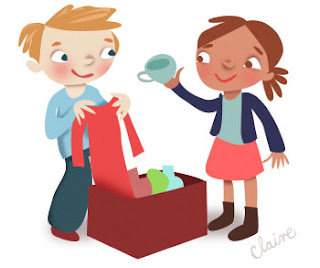Elanna Yalow, PhD weighs in on the benefits of dramatic play:
As most early childhood teachers know, dramatic play is an extremely valuable part of the daily curriculum. Here are just some of the benefits of dramatic play:
- Relief from emotional tension. Adults tend to cope with a traumatic event by retelling the event over and over. Children, however, tend to replay the event in their dramatic play. For example, if a child attends a funeral, she is likely to "play the funeral" afterward with friends, dolls, etc., as a way to come to terms with the event.
- Children feel powerful. When children re-enact frightening experiences, they tend to put themselves in a position of power. They may choose to play the mommy or daddy, the most powerful people in their lives. In dramatic play, the child can control the events, and wishes can come true.
- Use of social interaction skills. Dramatic play encourages children to put themselves in someone else's shoes. Such role-playing helps them to improve their ability to do this in real life. They learn important social skills, such as empathy.
- Language development. Dramatic play also encourages expressive language. Children are motivated to convey their wishes to others and speak from the perspective of their pretend roles. In fact, it is often through dramatic play that shy or withdrawn children first begin to express themselves through language.
- Use of symbols. Dramatic play furthers an understanding of symbols. For example, a doll becomes a symbol for a baby. A slip of paper may become money. Opportunities to create and use symbols help children to utilize other symbols, like letters and numbers.
- Sort out fantasy and reality. Dramatic play also allows children to differentiate between real and pretend. This is readily apparent when observing children using exaggerated voices to signal that they are playing their roles or in the child that announces, "It's just pretend." It may seem as though a child who has spent several hours engaged in dramatic play has just been "playing around" and has nothing concrete to show for it. On the contrary, the kind of play where a child takes on a role, and learns to interact from within that role, is very valuable to her development.





















